From Maria San Filippo (Emerson College):
This playlist, created as a tie-in to my Flow column “Maude & Me; Or, Responsibilities of a Feminist Media Critic,” features films that represent abortion in resonant, hopefully mind-changing ways. While scripted television has been increasingly willing to tackle the topic as channels proliferate and streaming content explodes, quantity doesn’t equal quality. Feeling that the most powerful and probing explorations of abortion continue to appear in film rather than on the small screen, I conceived this supplementary playlist to highlight works of cinema that combine advocacy for reproductive justice with compelling artistic accomplishment. Collectively they constitute a rallying cry against entrenched systems of injustice as well as sound an urgent alarm as hard-won reproductive freedoms have become newly endangered.
While this list comprises more recent films, cinematic treatments of abortion extend as far back as Lois Weber’s 1916 silent film Where Are My Children?, the object of illuminating scrutiny by film historian Shelley Stamp in A Feminist Reader in Early Cinema (Duke University Press, 2002). But with an eye to the importance of looking (so as not to move) backward, I’ve organized the list – and recommend viewing it – in order of when each film is set: beginning in pre-revolutionary France before leaping to 1950s England, France again in the 1960s and, after a visit to 1980s Romania, thereafter remaining up to the present in the US – where the rollback of reproductive rights has recently gained harrowing speed.
I’m grateful to another film historian, Maya Montañez Smukler, for her contribution of an entry on a 1970 film by Stephanie Rothman, one of the filmmakers Smukler profiles in Liberating Hollywood: Women Directors & the Feminist Reform of 1970s American Cinema (Rutgers University Press, 2018), who boldly brought abortion to the screen in a pre-Roe v. Wade production for exploitation maestro Roger Corman’s New World Pictures. Women filmmakers constitute a majority on this list, since with some notable exceptions, male filmmakers’ reliance on deflection and denial (ahem, Judd Apatow) in discussing “shma-shmortion” has meant that women from Weber on have taken the lead in dealing openly and maturely – and not without occasional comedic charge – with an issue that demands our attention and action.
Portrait de la jeune fille en feu (Portrait of a Lady on Fire, Céline Sciamma, France, 2019)
 Though not its central story, abortion figures significantly in this swoon-worthy tale of a love affair between a lady and a (female) bohemian artist in the 18th century. The episode – in which the lovers accompany a young scullery maid to a “medicine woman’s” hut – serves as the film’s centerpiece. In urging us, along with the companions, to bear witness to an act necessitated by a man never identified or seen, Sciamma attests to centuries-old, cross-class alliance among women, compelling us to look and to make art out of what we see.
Though not its central story, abortion figures significantly in this swoon-worthy tale of a love affair between a lady and a (female) bohemian artist in the 18th century. The episode – in which the lovers accompany a young scullery maid to a “medicine woman’s” hut – serves as the film’s centerpiece. In urging us, along with the companions, to bear witness to an act necessitated by a man never identified or seen, Sciamma attests to centuries-old, cross-class alliance among women, compelling us to look and to make art out of what we see.
Available to stream on: BBCiPlayer; YouTube; GooglePlay; etc.
Vera Drake (Mike Leigh, UK, 2004)
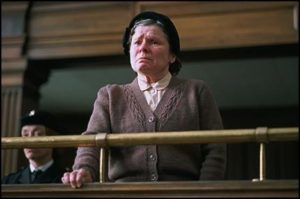 A topic tailor-made for Leigh’s brand of British kitchen sink realism, abortion as act of charity compassionately yet clandestinely practiced by Imelda Staunton’s eponymous working-class wife in 1950s England indicates how little had changed 150 years on. The hardened response, and harsh punishment, that awaits her upon discovery seems nearly outweighed by the sanctification Leigh bestows, yet (as the film suggests) if Vera Drake isn’t a modern-day miracle worker, who is?
A topic tailor-made for Leigh’s brand of British kitchen sink realism, abortion as act of charity compassionately yet clandestinely practiced by Imelda Staunton’s eponymous working-class wife in 1950s England indicates how little had changed 150 years on. The hardened response, and harsh punishment, that awaits her upon discovery seems nearly outweighed by the sanctification Leigh bestows, yet (as the film suggests) if Vera Drake isn’t a modern-day miracle worker, who is?
Available to stream on Apple TV and BFIplayer,
L’Événement (Happening, Audrey Diwan, France, 2021)
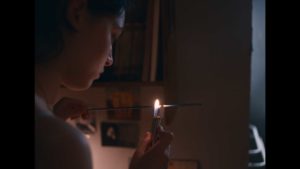 Adapted from Annie Ernaux’s memoir, this surefooted sophomore feature, which won the top prize at Venice, features an astounding performance by Anamaria Vartolomei. Like Dirty Dancing, a film I recall in my Flow piece as leaving an indelible impression on my pre-teen self, L’Événement looks back at an era in which abortion was harshly criminalized but (unlike Hollywood fantasy) refuses to look away. In two unsparing hours (in screen time) and twelve increasingly desperate weeks (in story time), this female bildungsroman becomes body horror, as endured by the real-life writer-to-be and countless others forced to desperate measures by unplanned pregnancy.
Adapted from Annie Ernaux’s memoir, this surefooted sophomore feature, which won the top prize at Venice, features an astounding performance by Anamaria Vartolomei. Like Dirty Dancing, a film I recall in my Flow piece as leaving an indelible impression on my pre-teen self, L’Événement looks back at an era in which abortion was harshly criminalized but (unlike Hollywood fantasy) refuses to look away. In two unsparing hours (in screen time) and twelve increasingly desperate weeks (in story time), this female bildungsroman becomes body horror, as endured by the real-life writer-to-be and countless others forced to desperate measures by unplanned pregnancy.
Currently playing festivals and in limited theatrical release. Anticipated UK release in April 2022.
Student Nurses (Stephanie Rothman, US, 1970)
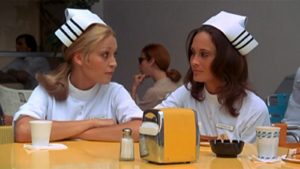 Student Nurses, made three years before Roe v. Wade, takes a thoughtful approach to the storyline of illegal abortion. Rothman works within the confines of the low-budget exploitation film, where every 15 minutes there must be scenes of violence, action, nudity or sex, by framing her characters through a feminist lens where women are not only at the center of the narrative, but friendship, professional development, and self-respect – albeit in a sexy nurse uniform – are paramount.
Student Nurses, made three years before Roe v. Wade, takes a thoughtful approach to the storyline of illegal abortion. Rothman works within the confines of the low-budget exploitation film, where every 15 minutes there must be scenes of violence, action, nudity or sex, by framing her characters through a feminist lens where women are not only at the center of the narrative, but friendship, professional development, and self-respect – albeit in a sexy nurse uniform – are paramount.
Stream free on Tubi (US) but potentially a quest elsewhere.
4 luni, 3 saptamâni si 2 zile (4 Months, 3 Weeks and 2 Days, Cristian Mungiu, 2007)
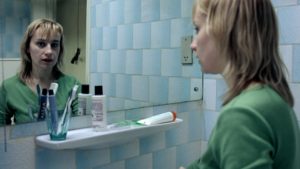 To my mind the apex of abortion’s screened representation, this masterwork by a leading figure of the Romanian New Wave takes us in near-real time procedural mode through two young women’s navigating of the direst of dilemmas in the bleakest of settings – two decades into the unrelenting dictatorship of Nicolae Ceaușescu – out of which somehow manages to spring hopefulness in the form of female friendship put to the ultimate test. Unflinching, unforgettable.
To my mind the apex of abortion’s screened representation, this masterwork by a leading figure of the Romanian New Wave takes us in near-real time procedural mode through two young women’s navigating of the direst of dilemmas in the bleakest of settings – two decades into the unrelenting dictatorship of Nicolae Ceaușescu – out of which somehow manages to spring hopefulness in the form of female friendship put to the ultimate test. Unflinching, unforgettable.
Stream on Amazon Prime Video; YouTube; Apple TV; Criterion Channel; Vudu
Trust (Hal Hartley, US, 1990)
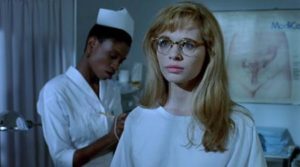 More caustic a critique of teen girlhood’s tribulations and abortion as rite-of-passage than the better-loved Fast Times at Ridgemont High (Amy Heckerling, 1982), Trust’s heroine – as played by (gone too soon) Adrienne Shelley – announces she’s pregnant in the opening scene only to have her father keel over dead. With the support of booze-swilling “Nurse Payne” and sister Peg (an early, outstanding Edie Falco), she journeys towards rebirth and in so doing crosses paths with the man who vows to “respect and admire,” rather than complete, her.
More caustic a critique of teen girlhood’s tribulations and abortion as rite-of-passage than the better-loved Fast Times at Ridgemont High (Amy Heckerling, 1982), Trust’s heroine – as played by (gone too soon) Adrienne Shelley – announces she’s pregnant in the opening scene only to have her father keel over dead. With the support of booze-swilling “Nurse Payne” and sister Peg (an early, outstanding Edie Falco), she journeys towards rebirth and in so doing crosses paths with the man who vows to “respect and admire,” rather than complete, her.
Stream free on Hoopla; rent on Amazon Prime Video; Vimeo on Demand;
~Intermission ~
That the self-satisfied anti-abortion indie Juno dominated the millennium’s first decade calls for a repeat endorsement of concurrent but superior in every way 4 Months, 3 Weeks and 2 Days.
~ ~ ~
Grandma (Paul Weitz, US, 2015)
 Writer-director Paul Weitz (he of the American Pie/About a Boy pedigree) is surprisingly the creative force behind this story of a septuagenarian lesbian (the supreme Lily Tomlin) called upon to help her Millennial granddaughter procure an abortion. Driving around Los Angeles in vintage wheels offers bonding time and a feminist history lesson similarly focused on the fading of American activism but with far more political bite than that of toothless near-contemporary Obvious Child (Gillian Robespierre, 2014).
Writer-director Paul Weitz (he of the American Pie/About a Boy pedigree) is surprisingly the creative force behind this story of a septuagenarian lesbian (the supreme Lily Tomlin) called upon to help her Millennial granddaughter procure an abortion. Driving around Los Angeles in vintage wheels offers bonding time and a feminist history lesson similarly focused on the fading of American activism but with far more political bite than that of toothless near-contemporary Obvious Child (Gillian Robespierre, 2014).
Available to stream on Amazon Prime; Apple TV; and many other places.
Never Rarely Sometimes Always (Eliza Hittman, US, 2020)
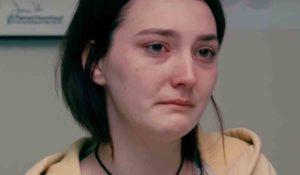 While Premature (Rashaad Ernesto Green, 2019) and Unpregnant (Rachel Lee Goldenberg, 2020) brought some much-needed diversity and levity to the abortion film corpus, Hittman’s astonishing depiction of another high school girl’s desperate endeavor to escape the dead-end to which her socioeconomic class and red state laws threaten to consign her is unsurpassed within American cinema. In a riveting long take sequence, performer Sidney Flanigan (in her screen debut) responds to a compassionate clinician’s intake survey (whose possible answers provide the film’s title) with mounting distress deriving from experiences only implied but plainly traumatizing. Corralling the power of this list’s cumulative themes – female solidarity and persistence in the face of fearsome obstacles and insidious intrusions on women’s bodies and rights, an excruciating ordeal ultimately gives way to a hopeful vision.
While Premature (Rashaad Ernesto Green, 2019) and Unpregnant (Rachel Lee Goldenberg, 2020) brought some much-needed diversity and levity to the abortion film corpus, Hittman’s astonishing depiction of another high school girl’s desperate endeavor to escape the dead-end to which her socioeconomic class and red state laws threaten to consign her is unsurpassed within American cinema. In a riveting long take sequence, performer Sidney Flanigan (in her screen debut) responds to a compassionate clinician’s intake survey (whose possible answers provide the film’s title) with mounting distress deriving from experiences only implied but plainly traumatizing. Corralling the power of this list’s cumulative themes – female solidarity and persistence in the face of fearsome obstacles and insidious intrusions on women’s bodies and rights, an excruciating ordeal ultimately gives way to a hopeful vision.
Available to stream on YouTube; GooglePlay; Apple TV; and elsewhere.
—
Maude & Me; Or, Responsibilities of a Feminist Media Critic: https://www.flowjournal.org/2021/11/maude-and-me/
—
Maria San Filippo is an associate professor in the Department of Visual and Media Arts at Emerson College, and editor of New Review of Film and Television Studies. She authored the Lambda Literary Award-winning The B Word: Bisexuality in Contemporary Film and Television (2013) and Provocauteurs and Provocations: Screening Sex in 21st Century Media (2021), both published by Indiana University Press, and edited the collection After ‘Happily Ever After’: Romantic Comedy in the Post-Romantic Age (Wayne State University Press, 2021).
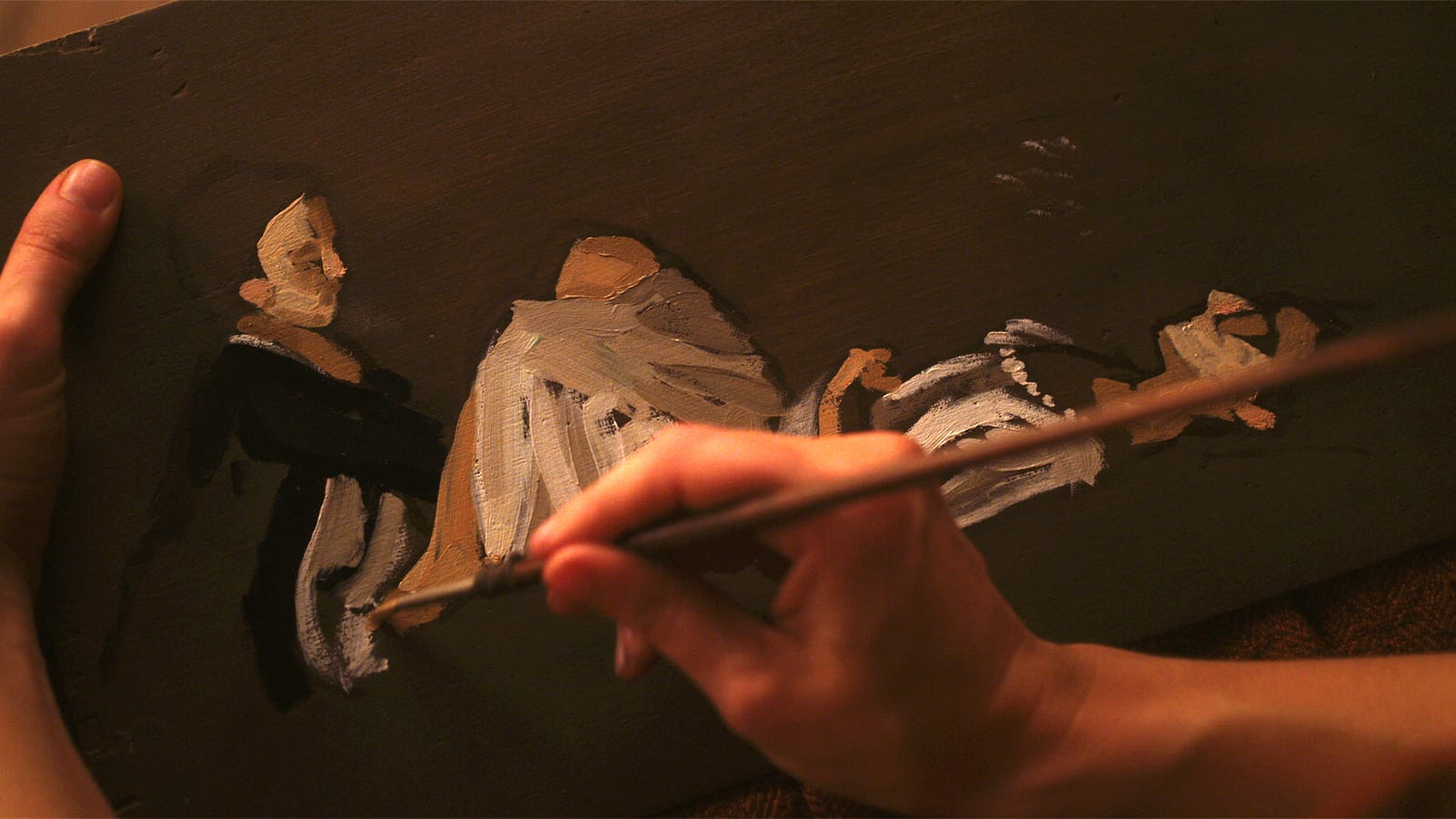
Thanks for these great suggestions, you may want to add Gillian Armstrong’s brilliant 1930s-set period short One Hundred a Day, made while she was a student at the Australian Film and Television School (in 1973). If you want to read about that, have a look in my book about Armstrong: Gillian Armstrong: popular, sensual and ethical cinema (published 2020, p. 7-8, apologies for the blowing of own horn!).
This is a really lovely list. I’d add here a documentary suggestion from the film Taking our Bodies Back (Margaret Lazarus & Renner Wunderlich– and others, 1974), which addresses multiple issues related to women’s health, including abortion. It features a procedure with a directness that seeks to destigmatise, naturalise, and familiarise women and people who can fall pregnant with something experienced by many. It’s an excellent film and available to rent on Vimeo: https://vimeo.com/ondemand/takingourbodiesback
From my inbox, a suggestion from Aimee Joyce: I wanted to share some links from the Irish Abortion Rights campaign. Firstly, the film “Twice Shy” (2016) which follows two young people travelling to England from Ireland to access an abortion. The ‘In Her Shoes’ facebook page also brought women and illustrators together to share their stories anonymously.
Thank you Julia, Leshu, and Aimee for these additions — all sound like invaluable complements to the list, which I hope continues to grow!
Having received the note below from Steph Herold, I wanted to share some links she referenced to peer-reviewed papers published by her team at UCSF’s Advancing New Standards in Reproductive Health (ANSIRH):
Over the last decade, we’ve published peer-reviewed papers on how race functions in TV abortion stories (https://www.tandfonline.com/doi/full/10.1080/14680777.2020.1856908?journalCode=rfms20&forwardService=showFullText&tokenAccess=Q4WFFAWIXWK795IQWAXT&tokenDomain=eprints&target=10.1080%2F14680777.2020.1856908), the impact of an abortion plotline on abortion knowledge (https://onlinelibrary.wiley.com/doi/10.1363/psrh.12183?af=R), analyzed how barriers to abortion access (https://journals.sagepub.com/doi/abs/10.1177/0959353516681245?journalCode=fapa) are often left out of TV portrayals, documented how abortion providers are depicted onscreen, and conducted on-going demographic analyses (https://www.contraceptionjournal.org/article/S0010-7824(20)30335-8/fulltext) of characters who obtain abortions compared to their real-life counterparts. Our work is mostly in the sociology/public health realm, and we’re eager to engage with more media studies scholars to bring that essential element to our work.
(Maria again) I’d also single out Pamela Thoma’s outstanding article “Buying Up Baby: Modern Feminine Subjectivity, Assertions of ‘Choice,’ and the Repudiation of Reproductive Justice in Postfeminist Unwanted Pregnancy Films” (https://www.tandfonline.com/doi/full/10.1080/14680770903233001), which I regularly teach in my course on romantic comedy, as well as Martha Shearer’s compelling chapter on ‘Obvious Child’ from my edited collection ‘After “Happily Ever After”…’
Although not filmed as such, I would like to bring up Vessel (Diane Whitten, 2014, https://vesselthefilm.com) which chronicles a ship’s navigation of international law and waters to provide abortions at sea. The film shows the building of an activist network and even offers instructions on how to provide a chemical abortion. It is a stunning work that is activist at its core.
Just adding this article to the conversation: https://maifeminism.com/breaking-the-abortion-taboo-anne-zohra-berracheds-film-24-weeks/
& there was also that film from a few years back now – ‘Obvious Child’ directed by Gillian Robespierre. It had Jenny Slate in.
Argentine filmmaker Andrea Testa’s documentary Mother-Child (2019) (Spanish original title Niña mamá) about which I wrote for The F-Word:
“It feels austere and subdued, the feeling compounded by black-and-white footage. The documentary is based in a public hospital in Argentina where girls and young women talk to doctors and health workers about the decisions they need to take about their pregnancies or early motherhood. As it’s purely observational, the film doesn’t fill the viewer in on the legal status of abortion in Argentina but it slowly becomes clear that the procedure is only legal in exceptional cases including when the conception is a result of rape or when the woman’s health or life is in danger. It is a testament to the power of non-interventionist observational documentary how the bigger picture and societal norms seep into slow-paced, respectful conversations between the girls and non-judgmental health professionals. Even though they are given that legal option, very few young women opt for termination and there are multiple references to pro-life campaigns exposing them to scare-mongering visual materials. The prevailing stigma against abortion is made obvious as several women cry when they realise they need to have termination. The chilling scene that stayed with me is of a pregnant thirteen-year-old who calls her pregnancy a ‘blessing’ and adds, unfazed, that she is considered high risk as her womb is not fully developed. The love and tenderness with which these mother-children (or niña mamás in Spanish) tend to their own children is heart-breaking. The majority of young women featured in the film seem resigned to their fate: not bothering with contraception at all; accepting that their male partners will refuse to use condoms; seeing having more children as a given, not a choice. On the other hand, those who want most reliable methods of contraception are often told about long waiting lists. The anonymous hospital in Argentina resonates with the global situation as 41% of women live under restrictive abortion laws and, according to the World Health Organization, 23,000 women die of unsafe abortion each year.”
https://thefword.org.uk/2020/07/women-make-films-about-women-at-sheffield-doc-fest-2020/